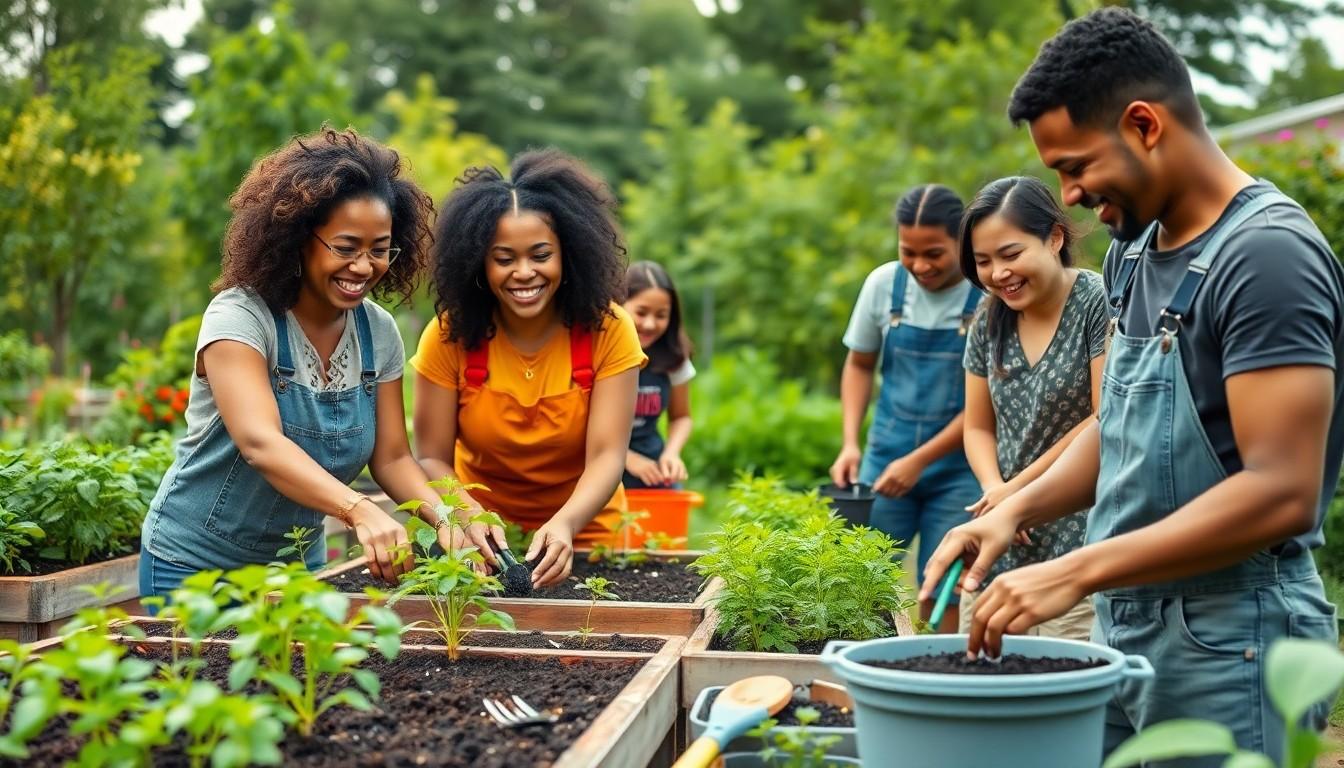The Best Fluffy Pancakes recipe you will fall in love with. Full of tips and tricks to help you make the best pancakes.

In a world where grocery store shelves sometimes resemble a game of Tetris, the idea of creating a homestead might sound like a whimsical escape. But “Homesteads for Hope” isn’t just about growing tomatoes and raising chickens—it’s about cultivating resilience and community. Imagine trading your daily commute for a stroll through your own garden, where fresh veggies and a sense of purpose thrive side by side.
This movement invites everyone to dig into the soil of self-sufficiency while sprinkling in a dash of optimism. Whether you’re a seasoned gardener or someone who can barely keep a cactus alive, there’s a place for you here. So grab your shovel and your sense of humor, because building a hopeful homestead might just be the most rewarding adventure you’ll embark on.
Homesteads For Hope
Homesteads for Hope promotes self-sufficiency through community-oriented practices. Individuals of all gardening skill levels participate in this movement, transforming their spaces into productive homesteads. Each homestead contributes to resilience in the face of challenges like grocery shortages and economic uncertainty.
This initiative cultivates more than just crops; it fosters optimism and personal growth. By embracing the principles of sustainable living, participants develop skills in gardening, food preservation, and resource management. Locations across various regions serve as centers for education and collaboration, bringing people together to share knowledge and experiences.
Programs under the Homesteads for Hope umbrella often include workshops on soil health, crop rotation, and permaculture. Volunteers and mentors assist newcomers, ensuring everyone feels welcomed and supported. Networking opportunities emerge as people connect over shared goals of sustainability and community enhancement.
Members celebrate successes, including bountiful harvests and strengthened community ties. With each planted seed, they express hope for a healthier future. Community gardens and personal homesteads reflect the dedication to food security and environmental stewardship. Resources become accessible to all, breaking down barriers to urban and rural farming.
Engagement in this movement offers individuals a chance to reclaim control over their food systems. As a result, they empower themselves and their communities, cultivating resilience for generations to come. Through collaborative efforts, Homesteads for Hope inspires many to embark on the journey of self-sufficiency, optimism, and sustainable living.
History and Purpose

The movement “Homesteads for Hope” originated from the need for resilience and community amidst modern challenges. Participants strive for self-sufficiency through local initiatives while fostering connections among individuals with diverse gardening backgrounds.
Founding Story
“Homesteads for Hope” began in response to food insecurity and economic instability. Pioneers of the movement recognized the importance of empowering communities through sustainable practices. Inspired by the hardships faced during economic downturns, they cultivated a vision where individuals could reclaim their food systems. Through this initiative, they aimed to inspire optimism and transform lives. Today, it has grown into a nationwide network supporting educational resources and local collaborations.
Mission Statement
The mission of “Homesteads for Hope” focuses on promoting resilience through sustainable living and community engagement. It aims to empower individuals by providing access to knowledge and resources in gardening, food preservation, and resource management. Fostering a sense of community, it prioritizes collaboration and the sharing of skills among participants. The movement actively seeks to inspire local initiatives that strengthen food security while nurturing environmental stewardship. Through education and hands-on experiences, “Homesteads for Hope” inspires individuals to embrace self-sufficiency and optimism.
Programs Offered
Homesteads for Hope provides a variety of programs designed to promote resilience and community engagement. Participants can access valuable resources through these initiatives.
Community Gardening
Community gardening creates a shared space for individuals to grow food together. Each member contributes to the maintenance of plots, fostering teamwork and connection. Group efforts lead to increased harvest yields, helping combat food insecurity. Participants also learn best practices for growing diverse crops. Networking within this environment fosters friendships, enhancing the overall sense of community.
Educational Workshops
Educational workshops cover essential topics for aspiring homesteaders. These sessions include hands-on training in areas such as soil health, crop rotation, and organic gardening. Expert instructors guide participants through practical applications, ensuring knowledge retention. Workshops encourage skill development for all experience levels. Networking opportunities within these workshops help participants build lasting relationships and support systems.
Sustainable Living Practices
Sustainable living practices focus on reducing environmental impact while promoting self-sufficiency. Participants explore topics like composting, water conservation, and renewable energy. Each approach fosters a deep understanding of ecological responsibility and sustainable resource management. Sharing successes and challenges enriches the learning experience. Engaging in these practices empowers individuals to make positive changes in their own lives and communities.
Impact on Local Community
Homesteads for Hope significantly affect local communities, fostering growth and resilience. The initiative cultivates social bonds while addressing food insecurity.
Success Stories
Participants frequently share their remarkable achievements within the movement. Community members have transformed vacant lots into flourishing gardens, leading to increased food production and local pride. One participant grew over 200 pounds of vegetables in a single season, illustrating the program’s impact. Workshops empower individuals to share knowledge, turning novices into skilled gardeners. Success stories create a sense of belonging, as members celebrate collective efforts and individual milestones.
Community Engagement
Engagement thrives within Homesteads for Hope through collaborative efforts. Community gardening initiatives unite individuals, encouraging teamwork to improve food access. Workshops and events draw participants together, creating strong networks based on shared learning experiences. Volunteers also play a vital role, guiding newcomers through challenges and fostering lasting connections. By actively involving diverse demographics, the movement enhances community resilience while promoting sustainable living practices. This inclusive approach reinforces the bond among participants, laying the foundation for a supportive environment.
Future Goals and Expansion Plans
Homesteads for Hope aims to broaden its impact by expanding programs and resources available to community members. New locations for educational workshops are planned, allowing more participants to engage in sustainable living practices. Training in essential areas like food preservation and resource management will continue, increasing competence among newcomers and experienced gardeners alike.
Community outreach initiatives target underserved populations, ensuring access to fresh produce and gardening education. Partnerships with local organizations enhance support networks, fostering collaboration on sustainability projects. By integrating technology into programs, Homesteads for Hope will offer online resources that enable participants to learn at their own pace.
Continued development of shared gardening spaces is a priority, creating more opportunities for community bonding and collaboration. With a focus on permaculture and advanced gardening techniques, the initiative promotes innovative approaches to food production. Workshops will cover topics such as hydroponics and vertical gardening, providing diverse methods to suit various environments.
Feedback from participants has shaped these goals, highlighting the need for tailored support and resources. Expansion plans include mentorship programs where experienced homesteaders guide newcomers through their journeys. These mentors foster valuable relationships, creating a sense of belonging within the community.
Homesteads for Hope intends to emphasize resilience through consistent evaluation of its practices and programs. By adapting to the needs of participants, the movement will continue to cultivate hope and self-sufficiency. Building a stronger network of supporters will amplify its mission, ensuring that communities grow and flourish together in the face of modern challenges.
Sustainable Living Practices
Homesteads for Hope stands as a beacon of resilience and community engagement. By empowering individuals to embrace sustainable living practices, it cultivates a sense of optimism and self-sufficiency. The initiative not only addresses food insecurity but also fosters strong connections among participants, creating a network of support and shared knowledge.
As it expands its reach and resources, Homesteads for Hope continues to inspire communities to reclaim their food systems. With a focus on education and collaboration, it paves the way for a brighter future where individuals thrive together. This movement represents a vital step toward building a more sustainable and resilient society.
